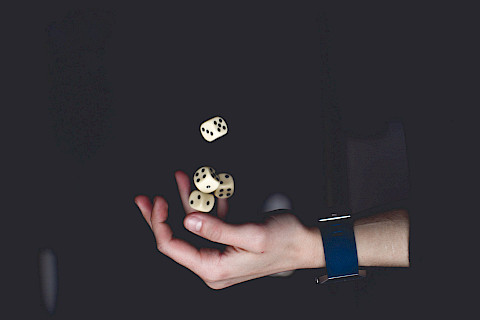

"What the eyes see and the ears hear the mind believes"
- Harry Houdini
The above is one of the more famous quotes from magician Harry Houdini. It is quite fitting for the title of this article because it was inspired by a modern-day magician who in fact was inspired to become an illusionist by reading about Harry Houdini. Funny how things can come full circle isn't it? I suppose we don't really use the word 'magician' anymore and even the concept of magic is not what we once believed it to be. Modern-day 'magic' is now considered to be an illusion as, over the past century, the veil of secrecy has been lifted and we were let into a lot of secrets behind these illusions. Houdini himself was a big part of this. While a magician never reveals his tricks, (an unsaid rule constantly broken) they do reveal that they are just that - a trick. An illusion created to entertain and amaze. Not deceive.
What inspired this article was my attending a performance by an Australian illusionist Cosentino who is quite popular here. After winning Australia's got talent he has done large scale performances with network television series aired as well. His show was a mixture of storytelling and performance. What is also was is honest. He stated that there were two sorts of people who attend the show. On one side you have your skeptics that in his words 'think he is full of shit'. Then you have the others that come to enjoy the performance for what it is - an illusion. He went on to show us that it is a magician's job to give you only part of the story of what is happening because it changes how we perceive what is happening. He started by drawing what looks like a smiley face and everyone agreed it was a smiley face. Of course, the drawing was not yet complete and ended up becoming a bowling ball. It was a simple explanation and naturally, I immediately drew comparisons to the paranormal field.
In fact, a lot of magicians/illusionists make this same connection as well with many of them bringing to light just how similar or easily something paranormal could be attributed to an illusion. It is what kept psychics during the Victorian era in business. They were considered borderline magicians themselves so it is no surprise that names like Harry Houdini devoted his time to studying and exposing their secrets. We as humans are all vulnerable to both deception and illusion meaning we are constantly questioning what is real and what is potentially paranormal. Not all of it is deliberate as it could simply be cognitive, but either way, it is still an illusion nonetheless.
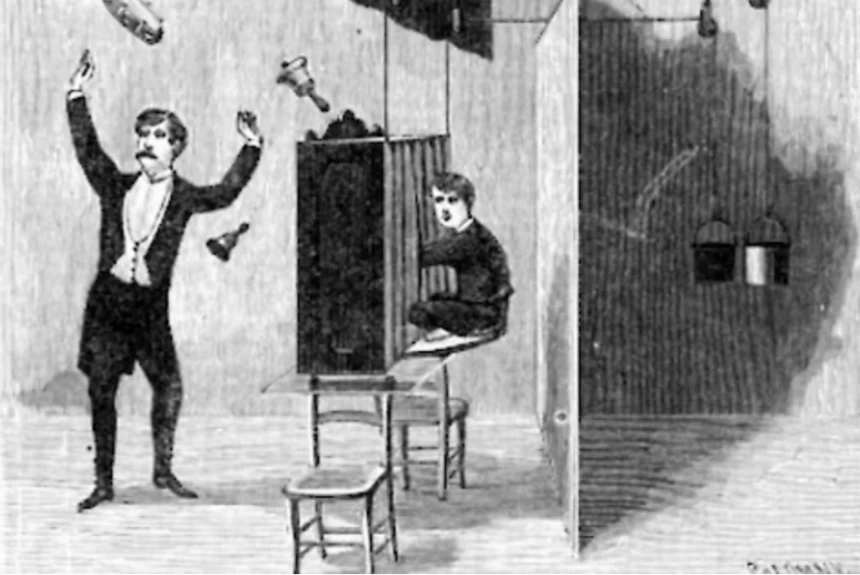
During the Victorian Era, the lines between magic and spiritualism were often blurred. What seemed like amazing supernatural acts were later found to be magic tricks. Read my article Stage Illusions
Magic and the paranormal
A good illusionist or magician knows very well just how much our brains can be vulnerable to cognitive bias. In fact, they rely on it to be able to successfully perform their tricks. A great illusionist will have their sitter walking away convinced they have some sort of special ability.
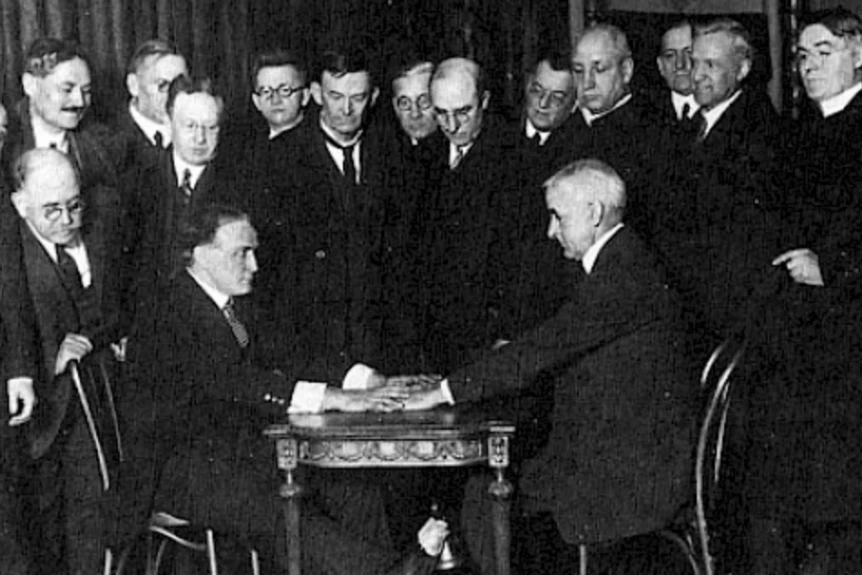
Harry Houdini is most well known as one of the world's greatest magicians and escape artists. Did you also know that he had a passion for debunking paranormal frauds? Read my article Harry Houdini - Magician AND Paranormal debunker
One such magician was Harry Houdini. After the death of his mother in 1920, he began to focus on debunking psychics and mediums. He initially tried to make contact with his mother through a medium, but quickly found that everyone he consulted, seemed to be a fraud (which was rampant in this era when spiritualism was at peak popularity). Psychics of the Victorian Era had become quite the 'magicians' themselves. Trained particularly in sleight of hand the difference instead of providing magic tricks as a form of entertainment, they relied on the bereaved and claimed to make contact with their deceased loved ones. Using his expertise, he would attend séances in a disguise and dramatically reveal his identity at the end and exposing the fraudulent mediums which gained a lot of press. He was then able to demonstrate exactly how they had deceived people which became his speciality. It seemed there was no psychic trick that he wasn’t able to emulate. He would often take interviews in the press exposing the frauds and during his silent movies, he would project slides of mediums and expose them and their lack of psychic ability.
The work of Houdini and others has continued over the years with several high profile magicians/illusionists associating their work to help understand the psychology of the mind. One of many studies in this area indicates that it could all be as simple as just believing.
This study uses conjuring to investigate the effects of suggestion, social influence, and paranormal belief upon the accuracy of eyewitness testimony for an ostensibly paranormal event. Participants watched a video of an alleged psychic seemingly bending a metal key by the power of psychokinesis. Half the participants heard the fake psychic suggest that the key continued to bend after it had been put down on a table and half did not. Additionally, participants were exposed to either a negative social influence (a stooge co-witness reporting that the key did not continue to bend), no social influence, or a positive social influence (a stooge co-witness reporting that the key did continue to bend). Participants who were exposed to the verbal suggestion were significantly more likely to report that the key continued to bend. Additionally, more participants reported that the key continued to bend in the positive social influence condition compared to the other two social influence conditions. Finally, believers in the paranormal were more likely to report that the key continued to bend than non-believers.
The results of this experiment largely confirm the basic finding of Wiseman and Greening’s (2005) experiments; that is, in this context, a relatively mild verbal suggestion from a fake psychic that a bent key continued to bend after it had been placed upon a table was sufficient to lead a substantial number of witnesses to erroneously report that the key had indeed done just that. In the no social influence condition in the current experiment, the condition most similar to that used by Wiseman and Greening (2005), one-third of the participants reported continued bending, compared to 39.13% in their Experiment 1 and 36.54% in their Experiment 2. Also in line with Wiseman and Greening’s (2005) findings, no participants in the no suggestion and no social influence condition reported continued bending.
Magic and memory: using conjuring to explore the effects of suggestion, social influence, and paranormal belief on eyewitness testimony for an ostensibly paranormal event
Krissy Wilson and Christopher C. French
Anomalistic Psychology Research Unit, Department of Psychology, Goldsmiths, University of London, London, UKhttps://www.frontiersin.org/articles/10.3389/fpsyg.2014.01289/full#B44
The above gives us an important clue which is common when we talk about the paranormal. You need to believe to REALLY see. Belief plays such an important role.
A perfect example here is that once Harry Houdini gave his then friend spiritualist Sir Arthur Conan Doyle a demonstration with spirit slates which caused Doyle to believe that Houdini really had psychic powers that he would not admit. While not revealing to Doyle how he did it (as back then a magician did not reveal his secrets), he wanted his friend to understand that it was an act of deception.
Sir Arthur, I have devoted a lot of time and thought to this illusion ... I won’t tell you how it was done, but I can assure you it was pure trickery. I did it by perfectly normal means. I devised it to show you what can be done along these lines. Now, I beg of you, Sir Arthur, do not jump to the conclusion that certain things you see are necessarily “supernatural,” or the work of “spirits,” just because you cannot explain them....
Harry Houdini
How we perceive the paranormal or 'magic' is influenced by our own belief systems. Perception and reality are different. Expectation alters perception.
Perception VS Reality
Perception is how our brain translates the things that we see and feel. It is subject to our own interpretation of a situation. People often confuse perception with that of reality. Reality is things as they really are. Our belief systems, our education, our past experiences and just who we are as a person shape how we perceive things. When it comes to the paranormal field, beliefs have a massive influence on how we perceive a situation. For example, if someone doesn't believe in ghosts and something strange happens in their house, they are more likely to blame it on some sort of natural phenomenon. Someone however who is very much into the spirit world may have the exact same experience, and their perception is that it is something paranormal. So who is right?
How reality appears to us depends on what kind of glasses we view the world in. The exact same thing can happen to 2 people in a room, yet they can both walk away with a completely different perception of what has happened. To them, their perception of the situation is their reality and in their mind, they are both right. The challenge in any situation is to separate perception from reality. While you may ask a 3rd party to decide this, again you are potentially being influenced by their own perception of what has happened. When everyone thinks so differently, how the hell are we supposed to know what the actual reality is? What actually happened?
Perception is not reality. If you are in a room on an investigation looking to find paranormal phenomena and a door slams, your first reaction is likely that it is something paranormal. If on the other hand, you are on an investigation to disprove the paranormal from a skeptical point of view, your first reaction is that it was just the wind or a weighted door. It was something of a natural cause. While after applying some critical thinking, that first initial reaction is the one that you have no control over. That is the one that is influenced by your belief system and the whole reason you are there.
There are things known and things unknown, and in between are the doors of perception.
Aldous Huxley
Don't we all want a little bit of 'magic' in our lives?
I wanted to close this by making a different kind of association between magic and the paranormal. We go to a magic show to get caught up in the moment and maybe to even believe that it is real for a couple of hours. I know that is what I did when I attended a recent show. I gasped in amazement and smiled throughout. My son was actually selected from the audience and was put in a cabinet and after blades were inserted in the box, his torso disappeared! I knew my son wasn't really being cut in half, but it was fun getting caught up in the moment and is likely something we will never forget. Of course, later that night after all the excitement ended, I lay in bed and found myself drawing diagrams and reading to try and 'debunk' the magic tricks. I myself needed to know how it was done. I was a little disappointed especially after quizzing my son and I worked out how the trick was performed. The magic was gone. Again I knew I was being deceived, but it didn't feel so magical once it was 'proven' not to be true.
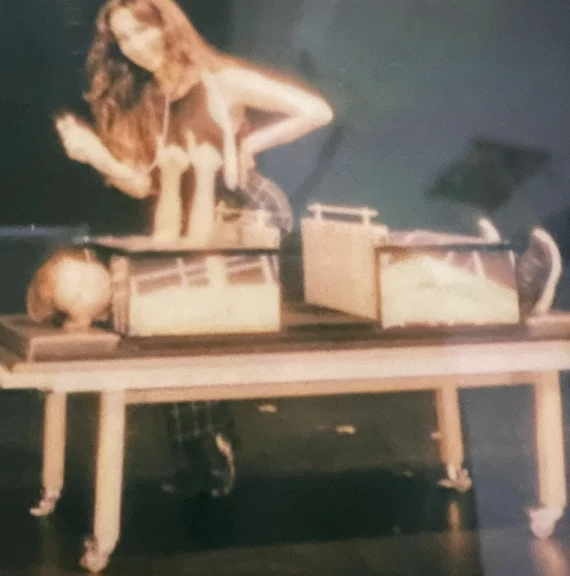
Polaroid taken by Cosentino the magician of my son 'cut in half' given as a keepsake. (Tell me in the comments how you think it was done!)
I make a similar comparison to a paranormal investigation. Most people are hoping to have some sort of experience when they attend a paranormal investigation. I like many others have often been caught up in a moment. With a loud bang, the adrenaline gets going and you just 'feel' like there is something with you. In the hours afterwards you replay things in your head. You watch the footage, listen to recordings and often you are able to debunk what really happened. sometimes you may even feel a little silly (I know I do) for getting so excited or caught up in something that in hindsight was so obvious. It all comes back to that word 'belief'. We either do or want to believe and so for those few hours, whether we are watching an illusion or participating in an investigation, we are giving ourselves over to magic and the paranormal. There is a reason that both fields have been around for such a long time. While there are explanations for both, there is still so much that seems to be unknown. We are certainly on the right track by exploring them in tandem as we know from past experience they work hand in hand. Magicians are now what I call 'honestly deceptive' in that they don't claim to be doing anything supernatural, it is all just natural but presented in a way our brains don't quite understand. So with that in mind, if we look at the paranormal through the same lens, maybe it is all just normal and is a normal part of our lives, much like Costenino explained with his drawing we just don't quite have all the information yet. I suppose paranormal investigation is about trying to complete that picture.
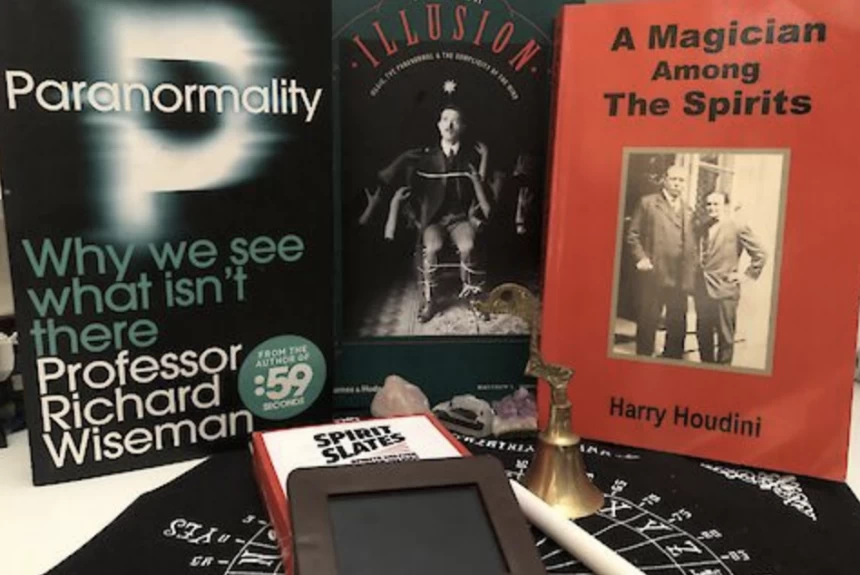
Recommended books to read in regards to Magic and the paranormal. Read my article Paranormal Book Club: Illusion
Cover photo Photo by lilartsy: https://www.pexels.com/photo/person-about-to-catch-four-dices-1111597/
If you enjoy LLIFS, consider buying me a book (otherwise known as buy me a coffee but I don't drink coffee and I LOVE books). Your donation helps to fund the LLIFS website so everyone can continue to access great paranormal content and resources for FREE!

Top pages with similar subjects
Don't forget to follow the Facebook page for regular updates
Join the mailing list to receive weekly updates of NEW articles. Never miss an article again!
Buy the latest and past issues Haunted Magazine
Check out the books written by LLIFS